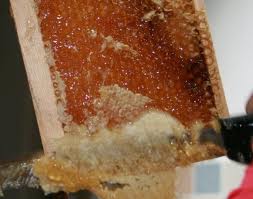Lughnasa Waxing Harvest Moon
Yesterday during the honey harvest (before the swarm) activity shifted among pulling frames from honey supers, delivering them for uncapping (Kate), getting them set in the extractor  and going downstairs to work on Mark’s Saudi visa. Shifting from the concrete tasks of honey to the abstract and electronic tasks associated with the visa application caused some mental whiplash.
and going downstairs to work on Mark’s Saudi visa. Shifting from the concrete tasks of honey to the abstract and electronic tasks associated with the visa application caused some mental whiplash.
We had a few setup problems. In fastening the extractor to the deck (again) we positioned the rack so we had to work with it in the rear, clumsy but not impossible. After we got it in place, we loaded it up with fresh frames full of honey.
Turned it on. Nothing moved except the electric motor. Neither Kate nor I are what I would call mechanical geniuses so we dithered with it, trying this and that, until we discovered it needed the top snugged against one side to allow the motor to mate with the rod connected to the centrifuge. After that the extraction moved along as planned.
Not sure on the total yet but we have at least double last year’s harvest, maybe more. Now, though, we have to bottle it and get its moisture content checked. Anything with a moisture content below 19.6 (if I recall correctly) is grade A honey and will keep forever though it may crystallize. Just warm it up and it will become liquid again.
Honey with too much moisture will start to ferment. This may be ok with you.
The harvest took from around 10 am until 3:45 or so. It was at that point that I decided to test my bee’s perimeter defense with my head.
